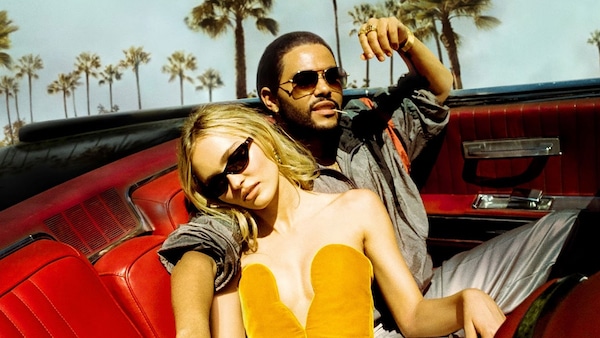Newsletter | The Idol: How Did HBO Get It So Wrong?
Save yourself the humiliation of suffering through The Idol — a senseless series strung together with an excess of exploitative on-screen sex. Joshua Muyiwa writes.

Last Updated: 11.01 AM, Jul 10, 2023
This column was originally published as part of our newsletter The Daily Show on July 10, 2023. Subscribe here. (We're awesome about not spamming your inbox!)
***
Editor's note: This review contains references to sexual assault as depicted in The Idol. Reader discretion is advised.
HBO’s The Idol is boring, banal and bad. And don’t let any Jordan Peterson type tell you otherwise. First things first, it isn’t just because the on-screen sex is explicitly exploitative. Or that those scenes simply remain at the level of the referential — think empty but even more stylised reproductions of Tom Ford’s art-directed ad campaigns for Gucci from the ‘90s. (Is it any wonder those photographers Mario Testino and Terry Richardson have been #MeToo-ed?) Because these scenes have been marketed as titillation but remain trite, tortured and thoughtless, it makes me want to join the prudes in protesting sex and nudity in our television shows. And they might be right — but only in the case of The Idol — it was completely unnecessary.
The breakdown: this five-episode drama stars Lily-Rose Depp as Jocelyn, a popstar staging a comeback, who begins a ‘complicated relationship’ with Abel Tesfaye (aka The Weeknd) as Tedros Tedros, a nightclub owner with a rat-tail and the pied piper of a talented band of musicians. While the machinery of marketing mania sold us the sex and shock of the show, the co-creators Sam Levinson (of HBO’s Euphoria) and Tesfaye were silently hoping audiences would see through to their ‘clever critique’ of pop music, stars and the industries around it. Even in this, it simply fails to deliver. Every proposed argument that “pop music is the ultimate Trojan horse — you get people to dance, you get people to sing along, and you can say whatever you want. Shit’s powerful!” is undercut by the grabby, greedy, lechy camera constantly creeping onto the women’s bodies in every single shot of the series.

When Tedros meets Jocelyn, she thinks her comeback single “World Class Sinner” is a silly little ditty on no-strings-attached sex while the rest of her team is certain it is a hit song. And surprise, surprise — he is the only one who agrees with her. Soon, she’s arranging to meet him back at her home studio because “he’s so rapey” and she “quite” likes that about him, to remix the single. They spend a night remixing it with actual sex sounds after Tedros uses erotic asphyxiation to get her to the real sounds. This is literally the whole premise of Tedros’ artistic philosophy: real artists turn real trauma and real experiences into real art. While that finite, false formula for artistic exploration has long been shown as simplistic and skipping a few steps, it won’t be the last time we see Tedros’ implementation of it.
In another episode, the confession of Jocelyn’s childhood trauma of being constantly hit with a hairbrush by her mother isn’t used as a breakthrough. It isn’t seen as an opportunity for Tedros’ guiding hand to help her find the truth in her voice. Rather, he publicly paws at Jocelyn, stimulating her private parts and making her gasp and moan for the recording in front of everyone gathered there. (Yuck!) The artistic work of exploring the self and its surroundings to reveal something else is about having time, training, technique — and talent. It isn’t ever about hurting and harming the self. And it definitely isn’t ever permission for one person to violate another either. The most frustrating thing about The Idol is that Tedros’ mode of psychosexual and emotional manipulation to bring out the authentic is presented as brand new. (Yuck. Yuck. Yuck. Yuck!) This terrible, tortured take on making art in the times of capitalism is truly the shocking bit of this series. How could they — Levinson, Tesfaye and HBO — get it so damn wrong?

And yes, there’s a host of characters besides these two in The Idol: Jane Adams’ salty recording label executive who has this intriguing (but unexplored) theory that “mental illness is sexy” because it makes men dream that these female celebs are attainable because they are flawed; Rachel Sennott’s assistant is always nervous and the only face who finds everything about this off-putting; Da’Vine Joy Randolph’s manager with some very powerful eyebrow work, as well as singers Troye Sivan, Moses Summney and Blackpink’s Jennie Kim, who managed to charge their roles with a glimmer of the real-world. Even if The Idol pushed the possible relationships between the lead characters and the supporting cast, it might have given us, the audience, a semblance of an intelligent show. Instead, it’s a whole lot of yuck.
It gets worse though: the finale has a ghastly, blink-and-you-miss-it plot twist. It seems to want to tell us that Jocelyn was more in control than thought to be. And in seeking to leave us with that message, it really ends up sounding like the men who say, ‘she knew all along and enjoyed it’. Even more yuck.
Save yourself the humiliation of suffering through The Idol — a senseless series strung together with an excess of exploitative on-screen sex. Instead, rewatch HBO’s Succession for its ruthless critique that still finds the honest, heartwarming humanity in the people we’ve come to hate the most: rich white men.
